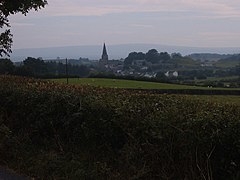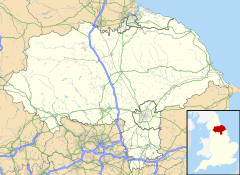Burton in Lonsdale is a village and civil parish in North Yorkshire, England, close to the border with Lancashire and Cumbria. It is in Lonsdale (the River Lune valley and its tributaries). The parish is approximately 1,500 acres (6 km2) in area and has many farms – dairy, beef and sheep. Little is grown, except grass to feed the animals.
| Burton in Lonsdale | |
|---|---|
 Looking south to Burton in Lonsdale | |
Location within North Yorkshire | |
| Population | 579 (2011 census)[1] |
| OS grid reference | SD651722 |
| Civil parish |
|
| Unitary authority | |
| Ceremonial county | |
| Region | |
| Country | England |
| Sovereign state | United Kingdom |
| Post town | CARNFORTH |
| Postcode district | LA6 |
| Police | North Yorkshire |
| Fire | North Yorkshire |
| Ambulance | Yorkshire |
| UK Parliament | |
The village was historically part of the West Riding of Yorkshire until 1974.[2]
Formerly famous for country pottery, it is now a quiet village situated between two national parks (the Lake District National Park and the Yorkshire Dales National Park) and by the side of the River Greta.
History
editThe settlement is mentioned in the Domesday Book as being in the Hundred of Amounderness, later being recorded in the wapentake of Ewecross.[3][4] The name derives from the Old English burh-tūn, a farmstead with, or near, a fortification (the castle). It was first recorded in 1130 as being either Burtona de Lanesdala, Burton(a) in Lanesdala, or Burton(a) in Lanesdale.[5][6] The village contains a motte that is the remains of Burton in Lonsdale Castle.[7] The castle belonged to the Mowbray family, and is believed to have been abandoned sometime in the middle of the 14th century.[8]
In his will of 1593 Henry the 4th Earl of Derby bequeathed his manor of Burton In Lonsdale to his second son the Hon William Stanley who less than two years later became the 6th Earl after the poisoning of his older brother Ferdinando the 5th Earl.
Stoneware and earthenware pottery was produced between about 1650 and 1944, in a total of thirteen potteries, using locally available clay and coal. It is said Burton was known as 'Black Burton' because of the amount of smoke produced by the kilns' fires when firing pots.[9][10][11][12] The firing was carried out over several days at a time, on a regular basis. The quality of the coal (initially locally sourced) was to blame for the amount of smoke. This was eventually replaced by better coal from South and West Yorkshire when the railways arrived in the locality.[13] Burton pottery is notoriously difficult to identify as most potteries did not mark their products.[14] Coal and clay were readily available from the Ingleton Coalfield, which outcropped at Burton in Lonsdale.[15]
The River Greta winds its way past the village to the south.[16] Several woodlands are sited on the banks of the river, some of them ancient. The paths leading to the wood has pottery remnants strewn across them.[17]
Modern village
editIn 2001, the census recorded 579 people living in the civil parish, which was unchanged at the 2011 Census.[18][1] In 2015, North Yorkshire County Council estimated the population to be 600.[19] The village has a community run shop (containing a small post-office) where local goods such as meats, cheeses and vegetables are available.[20] It also has a pub, The Punch Bowl.[21]
In August 2014 the village founded a road cycling club called Lonsdale Wheelers CC.[22] The club meets on the first and third Sundays of every month with a 10.00 start from the village shop.
The Village Hall hosts a number of regular clubs and events, details on the Village Hall page.[23] Events include circuit training, a monthly music night, a WI group and karate.
Also for the 2014–15 season a football club, Burton United F.C, was formed and admitted into the North Lancashire and District Football League.[24] The club however folded at the end of the 2015–16 season. The club played their home games at Burton recreation ground.
The village school closed in 2014, after pupil numbers fell to 13. The school had been built in 1853, with money donated by Richard Thornton, a millionaire who had been born in the village. Pupils now travel to Bentham for schooling.[25][26] The nearest railway station is at Bentham, some 3 miles (5 km) away, and the town of Settle is 12 miles (19 km) to the south-east.[27]
Notable people
edit- Laurence Binyon (1869–1943), poet who wrote For the Fallen, lived in the village between 1870 and 1875. The view of Ingleborough influenced his poem Inheritance[28][29]
- James Dyson (1914–1990), physicist who lived in the village in his childhood[30]
- Geoffrey Holmes, historian, lived in Burton in Lonsdale from 1969 onwards[31]
- Richard Thornton (1776–1865), the Victorian millionaire was born in Burton in Lonsdale. He donated £10,000 (equivalent to £1,208,000 in 2023) to fund a school in the village.[32]
See also
editReferences
edit- ^ a b UK Census (2011). "Local Area Report – Burton in Lonsdale Parish (1170216732)". Nomis. Office for National Statistics. Retrieved 16 March 2018.
- ^ "History of Burton in Lonsdale, in Craven and West Riding | Map and description". www.visionofbritain.org.uk. Retrieved 1 December 2020.
- ^ "Burton [in Lonsdale] | Domesday Book". opendomesday.org. Retrieved 21 April 2022.
- ^ "Genuki: In 1822, the following places were in the Parish of Thornton In Lonsdale:, Yorkshire (West Riding)". www.genuki.org.uk. Retrieved 21 April 2022.
- ^ Ekwall, Eilert (1960). The concise Oxford dictionary of English place-names (4 ed.). Oxford: Oxford University Press. p. 88. ISBN 0-19-869103-3.
- ^ "Burton in Lonsdale :: Survey of English Place-Names". epns.nottingham.ac.uk. Retrieved 21 April 2022.
- ^ Pevsner, Nikolaus, Sir (2003). Yorkshire The West Riding (2 ed.). London: Yale University Press. p. 152. ISBN 0-300-09662-3.
{{cite book}}: CS1 maint: multiple names: authors list (link) - ^ Speight 1892, p. 279.
- ^ Grabham, Oxley (1916). Yorkshire potteries, pots and potters. York: Yorkshire Philosophical Society. p. 10. OCLC 271039103.
- ^ "Burton Pottery". burton-in-lonsdale.net. Retrieved 21 April 2022.
- ^ Blade, Michelle (14 January 2021). "Dark history of Burton-in-Lonsdale pottery". www.lancasterguardian.co.uk. Retrieved 21 April 2022.
- ^ Self 2008, p. 143.
- ^ Mitchell, W. R. (1999). The story of the Yorkshire Dales. Chichester, West Sussex: Phillimore. p. 8. ISBN 1860770886.
- ^ Lawrence, Heather (1974). Yorkshire pots and potteries. Newton Abbot: David & Charles. p. 203. ISBN 0-7153-6663-7.
- ^ Bentley, John I. (2005). Ingleton Coalfield 1600-1940. Sheffield: Northern Mine Research Society. p. 16. ISBN 0-901450-58-8.
- ^ "Burton in Lonsdale". getoutside.ordnancesurvey.co.uk. Retrieved 21 April 2022.
- ^ "Greta Wood" (PDF). woodlandtrust.org.uk. p. 6. Retrieved 21 April 2022.
- ^ UK Census (2001). "Local Area Report – Burton in Lonsdale Parish (36UB015)". Nomis. Office for National Statistics. Retrieved 21 April 2022.
- ^ "2015 Population Estimates Parishes" (PDF). northyorks.gov.uk. December 2016. p. 10. Archived from the original (PDF) on 4 June 2022. Retrieved 21 April 2022.
- ^ BILCAA 2016, p. 7.
- ^ Newton, Grace (2 March 2024). "The Punch Bowl, Burton in Lonsdale: Yorkshire community launches bid to buy last of their village's 13 pubs and run it themselves". Yorkshire Post. Retrieved 5 May 2024.
- ^ British Cycling Page for Lonsdale Wheelers CC
- ^ Village Hall Events page Archived 22 August 2015 at the Wayback Machine
- ^ Moore, Lindsey (22 October 2015). "Burton FC faces exciting future with the opening of new sports pavilion". Craven Herald. Retrieved 21 April 2022.
- ^ Murphy, Tom (14 November 2013). "Richard Thornton's CofE Primary School at Burton-in-Lonsdale could be closed". The Westmorland Gazette. Retrieved 21 April 2022.
- ^ Webster, Jacob (26 October 2021). "Part of 160-year-old school on edge of Yorkshire Dales to be demolished for new homes". The Yorkshire Post. Retrieved 21 April 2022.
- ^ "Burton in Lonsdale West Riding". visionofbritain.org.uk. Retrieved 21 April 2022.
- ^ Mitchell, W. R. (1999). The story of the Yorkshire Dales. Chichester, West Sussex: Phillimore. p. 51. ISBN 1860770886.
- ^ "Brooke, Burton, Binyon and the Bare Blue Hill". www.northcravenheritage.org.uk. Retrieved 21 April 2022.
- ^ Allibone, T. E. (1991). "James Dyson 10 December 1914-22 January 1990". Biographical Memoirs of Fellows of the Royal Society. 37: 150. doi:10.1098/rsbm.1991.0008. S2CID 61284207.
- ^ "Obituary: Professor Geoffrey Holmes". The Independent. 27 November 1993. Retrieved 19 April 2022.
- ^ Self 2008, pp. 144–145.
Sources
edit- Burton-in Lonsdale Conservation Area Appraisal (PDF). cravendc.gov.uk/ (Report). Skipton: Craven District Council. August 2016. Retrieved 19 April 2022.
- Self, John (2008). The land of the Lune - and its tributaries : a guide to the region within the Lune Watershed. Brookhouse: Drakkar Press. ISBN 9780954860516.
- Speight, Harry (1892). The Craven and north-west Yorkshire highlands. Being a complete account of the history, scenery, and antiquities of that romantic district. London: E Stock. OCLC 7219082.
External links
edit- Media related to Burton in Lonsdale at Wikimedia Commons
- Welcome to Burton-in-Lonsdale
- Example of Burton in Lonsdale pottery at MERL
